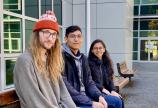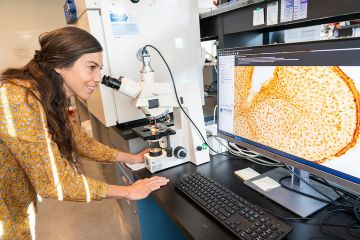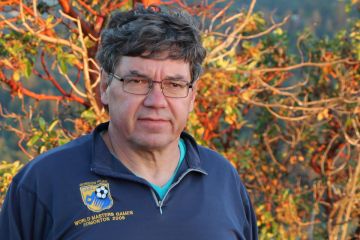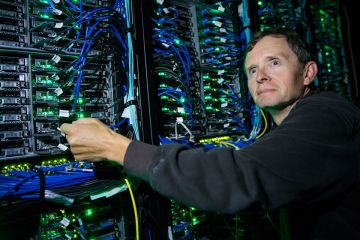Quantum leap for student computing team
- Anne Tolson
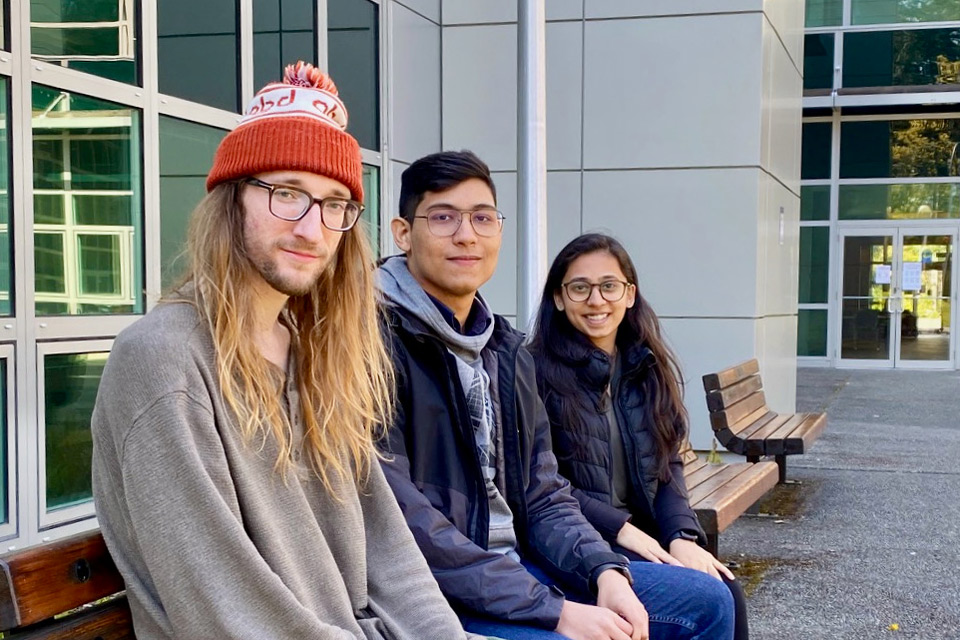
Three UVic students with a shared passion for quantum computing recently joined forces to win three categories in an international competition.
Tristan Zaborniak, Juan Giraldo and Saasha Joshi—all master’s students in computer science—were among hundreds of experts and enthusiasts from around the world who participated in QHack 2022.
The online competition included a series of increasingly difficult coding challenges that took place over 11 days, followed by a five-day open hackathon. Toronto-based Xanadu Quantum Technologies, which runs the annual competition, said 3,280 people and 800 teams signed up, representing more than 100 countries.
“We were looking to sharpen our quantum problem-solving abilities, showcase some original work, and possibly win prizes,” says Zaborniak. “Our group entered as team Qnyble and of the 13 hackathon challenges, we were awarded first place in three.”
Each of the challenges was sponsored by a leading company in the quantum field and came with its own prizes—including internships, mentorships, free access to top quantum computing platforms, laptops and headsets.
Hackathon projects were judged according to three criteria: scientific and technical ability; presentation quality; and depth of use of the quantum computing software and hardware stack.
Focusing on RNA behaviour
The UVic team focused on how quantum computing can be used to better understand and improve RNA folding predictions. RNA molecules are fundamental to many basic biological functions and have a structure somewhat similar to DNA. RNA’s ability to fold into stable 3D structures in tandem with the chemistry of its sequence dictate how it will interact with other molecules. Being able to predict how RNA folds is of pressing interest for human medicine, but is also extremely challenging using classical computers. Quantum computers—which allow for a potential speed-up on a specific set of hard computational problems, essentially by being able to take advantage of quantum mechanical properties such as superposition, entanglement and interference—could greatly enhance our understanding of RNA folding.
Team member Juan Giraldo says being able to better predict how a given RNA sequence folds could lead to the development of improved drugs and vaccines, as well as treatments for conditions such as Alzheimer’s and cancer.
“RNA can play an important role in those types of solutions,” says Giraldo, whose area of study is in the quantum software stack. “It’s important to note, for example, that COVID is an RNA virus, which can be protected against using an mRNA vaccine.”
Building the team
Giraldo, who is from Colombia, and teammate Saasha Joshi, who is from India, both decided to pursue their graduate studies at UVic after learning about the work of two researchers in UVic’s Department of Computer Science, Hausi Müller and Ulrike Stege, leaders in the quantum computing scene. Meanwhile, Zaborniak, who is from Comox and earned a BSc in physics and biochemistry at UVic, decided on a master’s that would allow him to focus on computational biology and quantum computing with Stege and Ibrahim Numanagić, another faculty member in computer science.
Joshi—who is pursuing an internship at IBM’s Thomas J. Watson Research Center near New York City this summer—was the one to suggest entering QHack 2022, posting about the competition on a Slack channel for students in the master’s program. Giraldo and Zaborniak answered the call.
“It’s surprising that we won in three challenges held by three different companies,” says Joshi, whose studies focus on quantum machine learning. “But, especially with COVID, there’s such intense interest in the area of RNA folding now—people are definitely giving it more attention.”
The three decided to focus on RNA folding for the competition as the result of coursework Giraldo and Zaborniak had already done in the area during a class with Hosna Jabbari, an assistant professor in computer science.
“We came in with that idea but it was a starting point—we had to follow the criteria that each company set out for its challenges,” says Zaborniak. “So, for example, in the Amazon-sponsored challenge, we had to use and integrate our work into Amazon’s platform.”
Their work paid off. The team’s prizes included an internship at drug design company Menten AI (Zaborniak will do the internship) and much-sought-after credits that provide them with access to several companies’ quantum computing platforms.
Since access to these platforms can be expensive, the credits will enable the three students to expand their project, says Giraldo. They’re also planning to submit a paper to IEEE Quantum Week, a high-profile international conference that attracts hundreds of industry leaders, researchers and educators.
“Participating in QHack 2022 was an amazing opportunity for our students to engage with the Canadian and international quantum computing industry,” says Stege.
NSERC program boosts quantum education
Müller called the students’ achievements “very impressive,” adding that a grant program developed last year by the Natural Sciences and Engineering Research Council (NSERC) has been of enormous benefit in attracting and training high-calibre future professionals in quantum computing.
“NSERC’s CREATE grant on Quantum Computing has enabled us to recruit stellar graduate students,” says Müller. Giraldo, Joshi and Zaborniak are among five UVic computer science graduate students who are NSERC CREATE scholars in Quantum Computing.
The unique training program—co-delivered by UBC, UVic and SFU—is an add-on to a graduate degree and is designed to equip graduates with highly specialized technical expertise and commercial skills in both quantum computing hardware and software.
Photos
In this story
Keywords: computing, technology, award, graduate research, genetics, viruses
People: Tristan Zaborniak, Juan Giraldo, Saasha Joshi
Publication: The Ring

